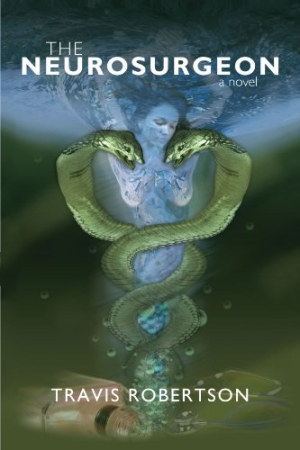The Neurosurgeon
Thoughtful people cannot read Travis Robertson’s first novel, The Neurosurgeon, without reexamining their own relationship to alcohol. This is an intense and fast-paced tale of booze, sex, and violence, played out by a talented and successful neurosurgeon and his four wives. It is not a pretty story and doesn’t have a Hollywood ending, but it is a realistic story.
Some say that a novel must start with a hook—a line or device that catches readers and propels them into the story. The Neurosurgeon begins deftly in 1961 with a teenaged girl visiting a hospital where her mother is confined after her husband, the child’s father, beat her. The daughter goes home and is violently raped by her father. This prologue ends leaving the reader tightly fastened to the hook.
The story then leaps awkwardly to 2003, to the tribulations of Dr. Ira Stone and his losing battle with alcohol. After an intervention of sorts, Stone leaves his home in North Carolina and flies to California to enter a residential drug and alcohol treatment program. The remainder of the book oscillates between descriptions of Stone’s experiences in the treatment center and accounts of his personal failures: his unsuccessful marriages, his contentious relationship with his father, and his deepening reliance on whiskey and tranquilizers.
At times, reading The Neurosurgeon is like watching a car wreck—sometimes grotesque, yet always compelling. Relationships are fractured and dissolved. People are hurt, even die. But once begun, there is no turning back from this riveting story.
Robertson connects the story of Ira Stone to the girl in the prologue about a third of the way through the novel. The connection is a bizarre story of a highly unstable woman bent on avenging an imagined wrong she attributes to Dr. Stone. Unfortunately for the good doctor, Jack Daniels and his compatriots make the neurosurgeon unable to clearly see his way through this morass.
Robertson writes well, especially for a first-time novelist. His characters appear on the pages as people the reader may know, and their experiences feel real. At a group session in residential treatment, a man describes taking his two young children to the park, where he drinks a bottle of whiskey and passes out: “‘Some woman found little Junie standing on the main street and bawling her eyes out. It was raining. And cold.’… James fidgeted with a pencil, silent, working his mouth. ‘Are you finished?’ inquired Fletcher. ‘What about the infant?’ ‘They never found Leslie.’ The pencil snapped in two, pieces dropping into his lap, the patient reduced to a despairing, breathless whimper.”
Songwriter and performer Billy Joe Shaver wrote the song “Black Rose,” whose lyrics include the refrain “The devil made me do it the first time / The second time I done it on my own.” This observation could be applied to Dr. Ira Stone, the protagonist in The Neurosurgeon. But so could the line from the hymn “Amazing Grace”: “I once was lost, but now am found.”
Reviewed by
John Michael Senger
Disclosure: This article is not an endorsement, but a review. The publisher of this book provided free copies of the book and paid a small fee to have their book reviewed by a professional reviewer. Foreword Reviews and Clarion Reviews make no guarantee that the publisher will receive a positive review. Foreword Magazine, Inc. is disclosing this in accordance with the Federal Trade Commission’s 16 CFR, Part 255.

